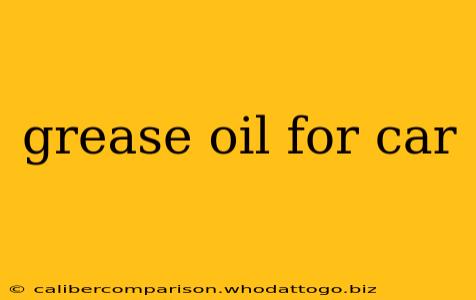Choosing the right lubricant for your car can feel overwhelming, especially when faced with the options of grease and oil. While both are crucial for keeping your vehicle running smoothly, they serve distinct purposes and have different properties. This comprehensive guide will help you understand the key differences between grease and oil, their applications in your car, and how to choose the appropriate lubricant for optimal performance and longevity.
Grease vs. Oil: What's the Difference?
The fundamental difference lies in their consistency and how they lubricate.
Oil: Oil is a fluid lubricant that flows easily, providing lubrication between moving parts with minimal friction. Its low viscosity allows it to penetrate tight spaces and quickly distribute throughout the engine. This makes it ideal for applications where components are constantly moving at high speeds, such as your engine, transmission, and differential.
Grease: Grease, on the other hand, is a semi-solid lubricant consisting of oil thickened with a soap-based or other thickener. This thicker consistency means it adheres better to surfaces, providing longer-lasting lubrication and protection against wear and corrosion. However, its reduced flowability makes it less suitable for constantly moving, high-speed components.
Where to Use Grease and Oil in Your Car
Understanding where each lubricant is used is critical for proper car maintenance.
Oil Applications:
- Engine Oil: The lifeblood of your engine, engine oil lubricates all moving parts, reducing friction, heat, and wear. Regular oil changes are essential for optimal engine health.
- Transmission Oil: Keeps the gears in your transmission running smoothly and prevents premature wear. The type of transmission fluid varies depending on the transmission type (automatic or manual).
- Differential Oil: Lubricates the gears in your differential, which allows the wheels to rotate at different speeds during turns.
- Power Steering Fluid: Assists the power steering pump in providing smooth steering. (Note: Some power steering systems use hydraulic fluid, not oil.)
Grease Applications:
- Wheel Bearings: Grease provides long-lasting lubrication and protection for wheel bearings, crucial components responsible for smooth wheel rotation.
- Chassis Lubrication: Grease is used to lubricate various chassis components, such as ball joints, suspension joints, and other moving parts exposed to the elements.
- Brake Calipers: Grease protects brake caliper pins from corrosion and ensures smooth operation. (Use only grease specifically designed for brake components).
Choosing the Right Grease and Oil: Viscosity and Type
The selection of appropriate grease and oil depends on various factors, including:
-
Viscosity: This refers to the thickness of the lubricant. Viscosity grades (like 5W-30 or 10W-40 for engine oil) are crucial in determining the lubricant's performance at different temperatures. Consult your owner's manual for the recommended viscosity grade for your car.
-
Type: Different types of oil (synthetic, conventional, semi-synthetic) and grease (lithium, calcium, etc.) offer varying levels of performance and longevity. Again, refer to your owner's manual for the recommended type.
Maintaining Your Car with Proper Lubrication
Regular lubrication is vital for preventing premature wear, improving fuel efficiency, and extending the lifespan of your vehicle. Follow the recommended maintenance schedule outlined in your owner's manual, and don't hesitate to consult a qualified mechanic if you have any questions or concerns about the type of grease or oil to use in your car. Ignoring lubrication needs can lead to costly repairs down the line. Preventative maintenance is always the most cost-effective approach.
Conclusion: The Importance of Lubrication
Choosing the right grease and oil for your car is a critical aspect of vehicle maintenance. By understanding the differences between these lubricants and following the recommendations outlined in your owner's manual, you can ensure your car runs smoothly, efficiently, and lasts for years to come. Prioritizing regular maintenance and using the appropriate lubricants will significantly contribute to your vehicle's overall health and performance.

